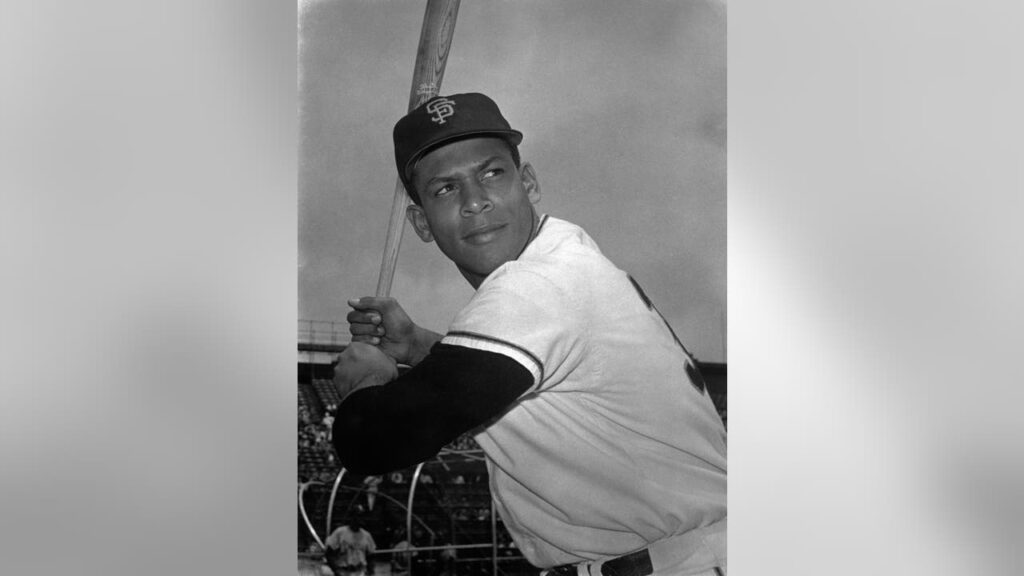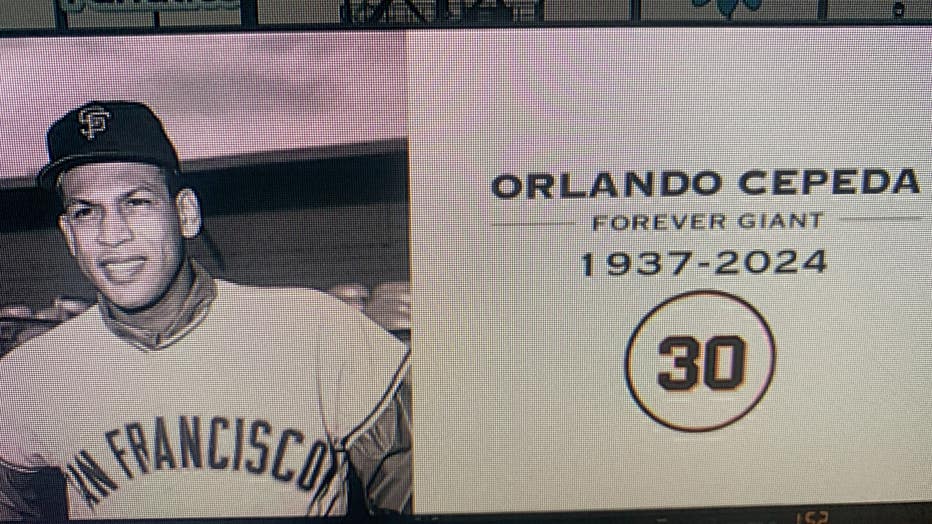
Orlando Cepeda Died 86 giants: Since 1958, Orlando Cepeda, rookie first baseman and left fielder for the San Francisco Giants, poses for a portrait in 1958. (Photo by The Stanley Weston Archive/Getty Images)
San Francisco – Orlando Cepeda, a first baseman nicknamed “Baby Bull” who became a Hall of Famer among the first Puerto Ricans to star in the major leagues, has died. He was 86 years old.
This San Francisco Giants And his family announced the death Friday night and a moment of silence was held on the scoreboard at Oracle Park in the middle of a game against the Los Angeles Dodgers.
“Our beloved Orlando passed away peacefully at home this evening, listening to his favorite music and surrounded by his loved ones,” his wife, Nydia, said in a statement released by the team. “We take comfort that he is at peace.”
Cepeda spent the last 33 years as a community ambassador for the Giants and was a member of the Giants Community Fund Advisory Board.
“We lost a true gentleman and legend,” Giants chairman Greg Johnson said in a press release. “Orlando was a great ambassador for the game during his playing career and beyond. He was one of the greatest Giants of all time and he will be truly missed.”
Read on complete statement From the Giants on the passing of Orlando Cepeda
“This is a truly sad day for the San Francisco Giants,” said Giants President and Chief Executive Officer Larry Baer. “For all of Orlando’s extraordinary baseball accomplishments, it was his generosity, kindness and joy that defined him. No one loved the game more. Our heartfelt condolences to his wife, Nydia, his five children, Orlando Jr., Malcolm, Ali. , Karl and Hector, their nine grandchildren, their one granddaughter as well as their extended family and friends.”
Cepeda was a regular at Giants home games during the 2017 season until he faced some health challenges. In February 2018, he was hospitalized in the Bay Area following a heart attack.
One of the first Puerto Rican stars in the majors but limited by knee problems, he became Boston’s first designated hitter and credits his time as a DH with being inducted into the Hall of Fame in 1999 by the Veterans Committee.
“Orlando Cepeda’s unbridled love for the game of baseball shone through during his extraordinary playing career and later as one of the sport’s enduring ambassadors,” said Hall of Fame Chairman Jane Forbes Clark. “We will miss his wonderful smile at Hall of Fame Weekend in Cooperstown, where his spirit will shine forever, and we extend our deepest condolences to the Cepeda family.’
When the Red Sox called in December 1972 to inquire if Cepeda needed to be their first designated hitter, the unemployed player accepted on the spot.
“Boston called me and asked if I was interested in being the DH, and I said yes,” Cepeda recalled in a 2013 interview with The Associated Press in the DH’s 40th year. “DH got me in the Hall of Fame. Rule got me in the Hall of Fame.”
Not knowing what that would mean for his career, he admitted, “I didn’t know anything about DH.” The experiment worked beautifully for Cepeda, who played 142 games that season—second-to-last in a 17-year major league career. The A’s released Cepeda on June 29, 1972, just months after acquiring him from Atlanta.
Cepeda was held at Fenway Park on May 8, 2013, celebrating his role as a designated hitter. The Red Sox invited him to their first home series of the season but his former Giants franchise was honoring the reigning World Series champions at the same time.
“It means a lot,” Capeda said afterward. “Awesome. Just when you think it’s over, it’s just the beginning.”
He said then-A’s owner Charlie Finley sent him a telegram to call within 24 hours or he would be released. Cepeda did not meet the deadline and was let go in December 1972. He played in just three games for Oakland after the A’s acquired him for pitcher Danny McLane. Cepeda was placed on the disabled list with a left knee injury. He underwent a total of 10 knee operations, sidelining him for four separate years.
Cepeda was a first baseman and outfielder before joining baseball’s first class of designated hitters under the new American League rule.
“They were only talking about doing it for three years,” he said. “And people still didn’t like the idea of DH. They said it wouldn’t last.”
The addition of the DH opened up new opportunities for Cepeda and other players from his era who could still produce at the plate late in their careers but no longer played in the field with the spot-on defense of their primes.
Cepeda was thrilled to get another chance.
He hit .289 with 20 home runs and 86 RBI in 1973, starting strong in April with a .333 average and five homers. He scored 23 runs in August en route to DH of the year honors. On August 8 at Kansas City, Cepeda hit four doubles.
“It was one of the best years,” Cepeda recalled, “because I was playing on one leg and I hit .289. And I hit four doubles in one game. Both of my knees hurt, and I was the hitter of the year. appointed.”
Cepeda topped Baltimore’s Tommy Davis (.306, seven homers, 89 RBI) and Minnesota’s Tony Oliva (.291, 16 HR, 92 RBI) for top DH honors.
“Winning the award was not easy for me,” Cepeda said. “He had some good years.”
Cepeda knew little English when he came to the minor leagues in the mid-1950s, which put him in the first wave of Spanish-speaking players thrown into a different culture to play professional baseball, build a new life and send money home.
He had a chance to succeed in the sport he loved, as long as daunting off-field challenges could be overcome.
Initially, Cepeda was told by a manager to go home to Puerto Rico and learn English before returning to his career in the US.
Tribute to Willie May at Oracle Park
Fans flocked to San Francisco’s Oracle Park on Thursday to watch the St. Louis Cardinals take on the San Francisco Giants in a tribute game for the late, great Willie Mays.
“Coming here my first year, everything was new to me, amazing,” Capeda recalled in a 2014 interview with the AP. “When I got to Virginia, I was there for a month and my dad died. My dad said, ‘I want to see my son play pro ball,’ and he died the day before I played my first game at Virginia. “
“From there I went to Puerto Rico and when I came back here, I had to come back because we had no money and my mother said, ‘You have to go back and send me money, we don’t. There is money to eat,'” he said.
Cepeda continued to be encouraged by seeing many young players from Latin America come to the United States with better English skills, thanks in large part to all 30 major league organizations placing greater emphasis on such training through academies in the Dominican and Venezuela.
English classes are also offered to young players during spring training and extended spring, in addition to various levels of the minor leagues.
He had his troubles too.
Cepeda was arrested in May 2007 after being pulled over for speeding when officers found drugs in the car.
A California Highway Patrol officer arrested Capeda after finding a “useful” amount of a white-powder substance that was likely methamphetamine or cocaine, while marijuana and a syringe were also found.
After his playing career ended, Cepeda was convicted of marijuana smuggling in San Juan, Puerto Rico in 1976 and sentenced to five years in prison.
It was probably one of the reasons why he was not elected to the Hall of Fame by the Baseball Writers Association of America. Cepeda was eventually elected by the Veterans Committee in 1999.
Cepeda played first base during his 17 seasons in the majors, starting with the Giants. He also spent time with St. Louis, Atlanta, Oakland, Boston and Kansas City. In the spring of 1969, Cepedano was traded by the Cardinals to the Braves for Joe Torre.
A seven-time All-Star who played in three World Series, Cepeda was NL Rookie of the Year in 1967 with San Francisco in 1958 and NL MVP, a city sad to see him go in the trade that brought Torre. town. In 1961, Cepeda led the NL with 46 homers and 142 RBI. Cepeda was a .297 career hitter with 379 home runs.
After his 1973 season as DH, Capeda could look back and appreciate what he accomplished that year – along with the huge part he played in changing history and the game.
“I just did,” he said of learning to DH. “Every day, I tell myself, how lucky I am to have been born with the ability to play ball.”
Cepeda’s death comes 10 days after another star player and legend, Willie Mays, 93, dies.
KTVU and Bay City News contributed to this report.

Orlando Cepeda on the Giants scoreboard. (Orlando Cepeda Died 86 giants)
Orlando Cepeda Died 86 giants, orlando cepeda,san francisco giants,orlando cepeda giants,orlando cepeda death,giants,orlando cepeda news,orlando cepeda dies,orlando cepeda stats,orlando cepeda announcement,orlando cepeda espn,espn orlando cepeda,orlando cepeda highlights,orlando cepeda career,orlando cepeda legacy,orlando cepeda tribute,orlando cepeda baseball,orlando cepeda cardinals,orlando cepeda hall of famer,baseball legend orlando cepeda,how orlando died,sf giants